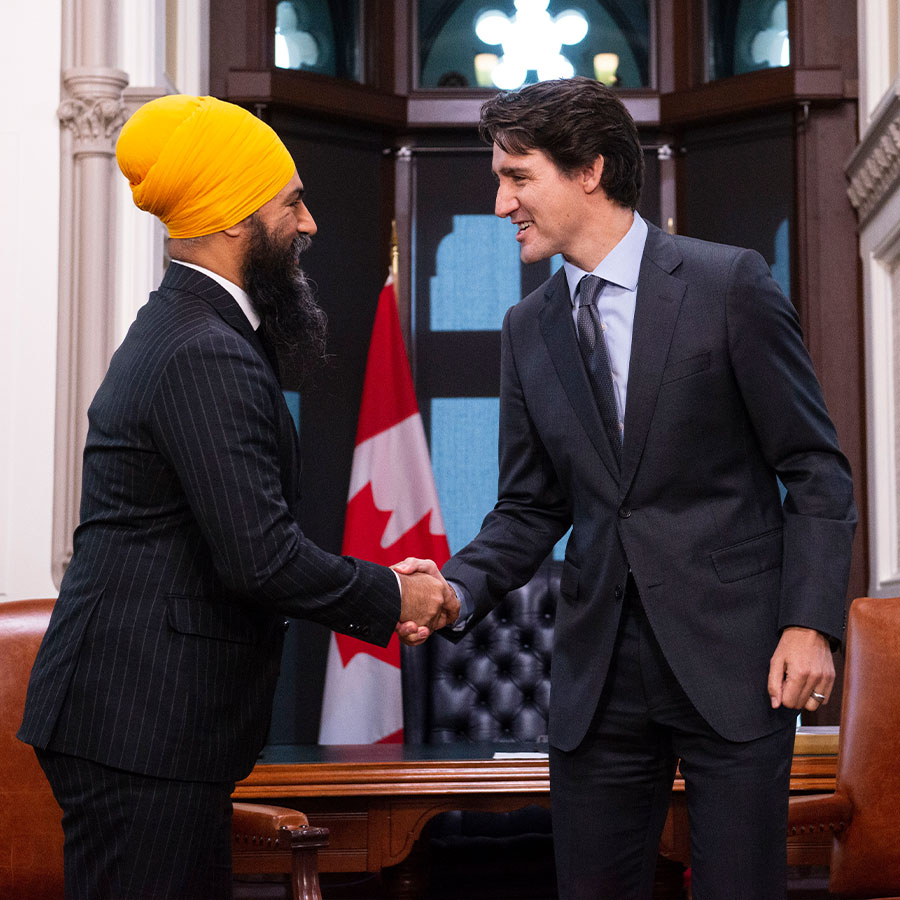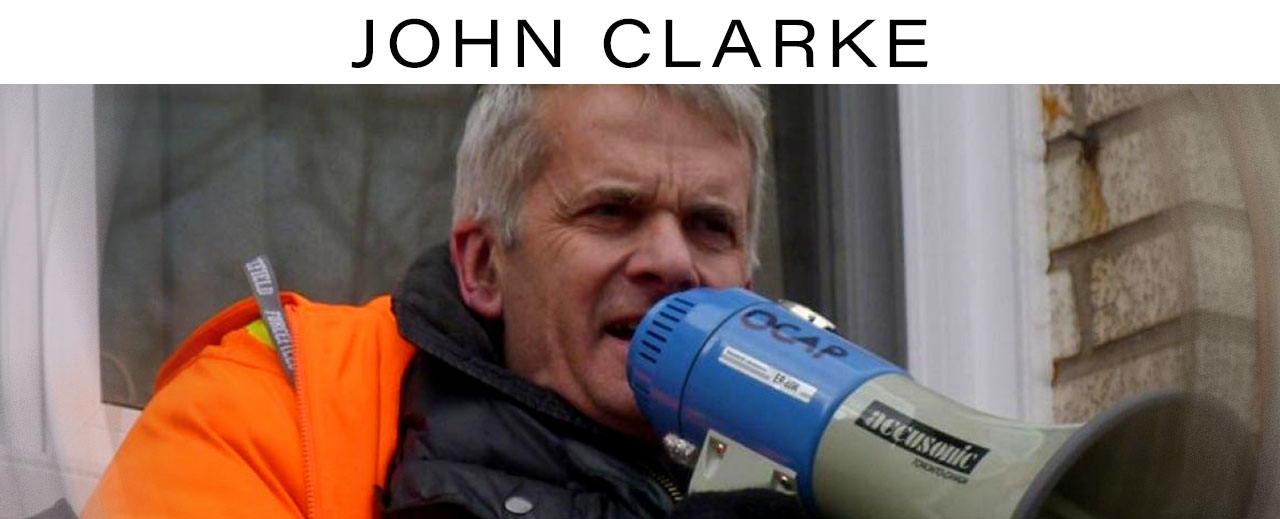
First written for Counterfire.
The Trudeau government has failed to attain a parliamentary majority in the last two federal elections. As a party of the neoliberal centre, the discredited Liberals are, as I have previously argued, governing by default. They cling to power only because their political rivals to the right and left have their own problems and weaknesses.
Canada’s social democrats, in the New Democratic Party (NDP) have now compounded their inability to pose as a serious left alternative to the Liberals by entering into a ‘confidence-and-supply agreement’ that will offer enough votes in parliament to keep the Trudeau government afloat until 2025. The key elements of the deal are “commitments to subsidized dental care and progress on pharmacare.” The second line of the agreement states that ‘‘To ensure coordination on this arrangement, both Parties commit to a guiding principle of 'no surprises.’’
Both parties entrusted their negotiations to a “tight circle” around Trudeau and NDP leader Jagmeet Singh to prevent the risk of leaks. An NDP source expressed some pride in “the very mature way” in which they cooperated with the Liberals and the "honest and forthright" dealings they had with each other.
While such a deal had been under consideration for some time, the final details were nailed down under strong pressure because they needed to be settled prior to the federal budget in early April and before the Prime Minister left for a summit of Nato leaders. Before heading off for Brussels, Trudeau declared that “With so much instability around us, Canadians need stability.” It might be suggested that his government’s need for stability had a lot more to do with this deal than he was admitting.
Interim Conservative leader Candice Bergen felt obliged to denounce the understanding between her parliamentary opponents but her flowing rhetoric was singularly unconvincing. According to her, political power has been handed over to a “socialist” NDP and “a radical and extreme agenda to expand the power of government by taking away the freedoms of the people” has now been unleashed. This is rather inflated language to use in response to a modest extension of public healthcare and, in fact, the Liberals are staving off the threat of yet another election at remarkably low cost.
Business agenda
A CBC report expressed something rather important that went into the making of this deal, when it stated that,
“While Trudeau and Singh clashed directly and sometimes fiercely during last fall's election, there was significant overlap in the parties' broad priorities on affordable housing, health care, climate change and reconciliation.”
The significance of these Liberal concessions on social policy are worth considering but the larger question is how it is possible for a party that is supposed to struggle for working class interests to have so much in common with a body that represents the Canadian capitalist class. I admit that this question is somewhat rhetorical because such behaviour by social democratic parties is hardly unprecedented. Still, it is worth exploring in the Canadian context.
Though there is a left within the NDP that seeks to assert a meaningful influence on the party, there has been no experience comparable to the Corbyn project in this country and no period when the austerity consensus has been seriously challenged. When Keir Starmer disgracefully asserts that Jeremy Corbyn won’t have the Labour whip restored unless he repudiates the Stop the War coalition and pledges his allegiance to Nato, there is a shocking sense of the restoration of a reactionary leadership. When an NDP politician, however, disgracefully uses the housing crisis to whip up Russophobia, a sigh and a shrug are the likely response.
The great problem for Canadian social democracy, as it seeks a place close to the political centre, is the existence of a formidable and highly adaptable Liberal Party. The Liberals have sometimes had to sit in the opposition benches, while the Conservatives took their turns at running the government but the NDP has never been elected at the federal level. This is entirely attributable to the chameleon like ability of the Liberals to ‘campaign on the left and govern on the right.’ Time and again, they have been able to adopt a progressive pose, while the NDP has failed to establish itself as a serious alternative on the left. Trudeau didn’t invent this form of deception but he has used it to good effect.
In Britain, the Blairite drive, restored in full by Starmer, to ensure that the Labour Party is a completely reliable understudy to the Tories, with its left wing reduced to anachronistic irrelevance, has been a despicable undertaking but it is at least politically coherent. In the case of the NDP, however, the firm control that the Liberals have on the centre ground of electoral politics means that the NDP is vying for a place that is already occupied by a strong formation that has no intention of relinquishing it.
Selling out
As I suggested, those who will justify or even applaud this deal with the Liberals, will do so on the grounds of supposed pragmatic advantages. In this regard, the federal budget that was presented on the heels of the signing of the agreement is the immediate and obvious test. The Canadian Union of Public Employees (CUPE) put out a statement on the budget that offers a good opportunity to assess whether the NDP’s Faustian deal has changed the political landscape to the advantage of working class people and communities.
CUPE suggests that the budget “fails to make progress on key issues” despite greater than expected sources of revenue. It “ignores the crises in health care and climate change and relies too heavily on private-sector investment in private infrastructure.” The report acknowledges that “the NDP’s influence in dental care is obvious” but concludes that “other areas in need of immediate investment like long-term care are absent.” Tellingly, CUPE points out that “A large investment in defence spending reflects our current geopolitical struggles but does not help Canadians who have the greatest need.”
In straightforward terms, this is a budget that utterly fails to respond to the cost of living crisis and other hardships generated by the pandemic and the conflict in Ukraine. A concession on dental care is included to meet the terms of the deal with the NDP but it is clear that the burden for the present crisis in society will be shouldered by working class people.
The NDP has reduced itself the sad role of political enabler and the Liberals have bought themselves this useful service for a song. The pathetic reality is that the NDP leadership has even failed on its own terms. It has completely and utterly failed to demonstrate that it offers any serious left alternative to the business agenda of the Liberals and the future electoral implications of this are grim indeed. To be blunt, it is a case of selling out when no one’s buying.
The great irony is that, if the NDP were to advance and fight for policies that offered real protections and improvements for workers and hard pressed communities, of a kind that no Liberal government would ever consider or enter into deals over, such a political direction would resonate powerfully and change the electoral balance of forces.
I write these lines knowing that the NDP leaders, with their narrow viewpoint that is limited to the dictates of parliamentary shadow boxing, would be no more likely to take a bold and radical direction than Keir Starmer and his kind would be march on the streets against Nato. Those who fight for a change of direction in the NDP deserve respect and support but the immediate focus and the way forward must be to rejuvenate our unions and build our social movements. It is on the streets and the picket lines that the basis for a new political direction can be generated.
